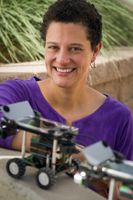Recent News
UNM Engineering names Prabhakar inaugural Cleve Moler and MathWorks Endowed Chair
October 3, 2025
Computer scientist wins Athlete of the Year Award for adaptive skiing technique
May 29, 2025
Hand and Machine Lab wins 2 awards at CHI conference
May 15, 2025
News Archives
Computer Science professor awarded grant to study cooperative behavior
July 30, 2014
UNM NEWSROOM
by Kim Delker
August 12, 2014
|
|
|
Melanie Moses, associate professor of Computer Science, will use iAnts - autonomous robots with iPhone brains that were built in her lab - to simulate how sensing, navigation, and communication behaviors affect collective search success in a variety of real world environments. |
Cooperation is also found in our bodies, with trillions of immune cells flowing through our blood vessels and crawling through our tissues, collectively fighting disease. It’s present in the ground we walk on, too, with millions of ants cooperatively searching for food to survive in their environment.
What do all of these things have in common? And what can we learn from these systems? That’s what Melanie Moses, associate professor of computer science, would like to find out.
Moses has received a six-year, $450,000 grant from the James S. McDonnell Foundation 21st Century Science Initiative in Studying Complex Systems to study how cooperative behavior emerges in complex systems.
“We’d like to be able to develop a theory of how cooperation emerges that’s generalizable to a lot of different systems, including human systems, where almost everything we do is in some sense cooperative, from transportation infrastructure to food networks,” she said. “We don’t have much of an understanding of what behaviors generate effective cooperation. The hope is that this research contributes to an understanding of how cooperation is beneficial and what prevents it. In human societies, that’s a very important question.”
The grant began Aug. 1 and will involve a variety of students — undergraduates, graduate students, and even high school students. Some of the undergraduates will be participating through the Science, Technology, Engineering, and Mathematics Talent Expansion Program (STEP), a National Science Foundation-funded program that addresses student retention and success in the STEM disciplines. UNM students working on the project will be from the departments of Computer Science as well as Biology and the School of Medicine.
The beginning phases of the project will involve learning how both ants work together in colonies and how T cells work together to fight pathogens and about what kinds of communication are most effective in specific circumstances.
Moses will be collaborating with Judy Cannon, an assistant professor in the Department of Molecular Genetics Microbiology at the UNM School of Medicine, to examine how T cells move when searching for pathogens in the lung. The collaboration is sponsored in part by UNM’s New Mexico Center for the Spatiotemporal Modeling of Cell Signaling.
“We’ll be looking at questions like, during an infection, how do your T cells move and communicate to eradicate the infection as rapidly as possible? Are there diseases that impair the ability for T cells to move and communicate? Are there possibilities for therapies that could improve immune response by altering T cell movement?”
While ants crawling around on the ground are often taken for granted, Moses says there is a lot we can learn from them.
“One of the reasons we study ants is that they have evolved to cooperate, and there aren’t the same conflicts between individuals that we have in human societies. In an idealized world, we could see cooperation like this, but barriers exist because humans are self-interested in many cases. Ultimately, we’d like to have some kind of a theory about cooperation so we could work toward that,” she said.
Moses will use iAnts — autonomous robots with iPhone brains that were built in her lab. The simulations will test how sensing, navigation, and communications behaviors affect collective search success in a variety of real-world environments.
“Computation is key to understanding the nonlinear interactions involved in effective cooperation,” she said. “Writing down equations isn’t sufficient for understanding the interactions among the individuals.”
Moses, whose Ph.D. is in biology, is also a faculty member in the UNM Department of Biology and is an external faculty member at the Santa Fe Institute.
She says much of the work on the project will be basic science, and some of the work on the hypotheses the first couple of years will undoubtedly lead to new hypotheses and research questions to be explored. But she says the ultimate goal is to better understand how individuals work together, whether that’s humans in a society or cells in our body.
Moses would like to be able to develop a mathematical formula that would predict performance of cooperative search strategies.
“We’re hoping there are biomedical applications in the long run,” she said, particularly in the areas of vaccine design and immunotherapy.

